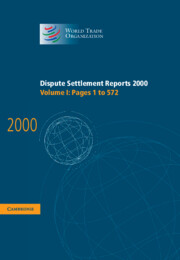Book contents
- Frontmatter
- Contents
- Korea - Definitive Safeguard Measure on Imports of Certain Dairy Products (WT/DS98/AB/R, WT/DS98/R): Report of the Appellate Body
- Korea - Definitive Safeguard Measure on Imports of Certain Dairy Products (WT/DS98/AB/R, WT/DS98/R): Report of the Panel
- Chili - Taxes on Alcoholic Beverages (WT/DS87/AB/R, WT/DS110/AB/R, WT/DS87/R, WT/DS110/R): Report of the Appellate Body
- Chili - Taxes on Alcoholic Beverages (WT/DS87/AB/R, WT/DS110/AB/R, WT/DS87/R, WT/DS110/R): Report of the Panel
- Argentina - Safeguard Measures on Imports of Footwear (WT/DS121/AB/R) Report of the Appellate Body
- Cumulative Index of Published Disputes
Chili - Taxes on Alcoholic Beverages (WT/DS87/AB/R, WT/DS110/AB/R, WT/DS87/R, WT/DS110/R): Report of the Appellate Body
Published online by Cambridge University Press: 22 December 2017
- Frontmatter
- Contents
- Korea - Definitive Safeguard Measure on Imports of Certain Dairy Products (WT/DS98/AB/R, WT/DS98/R): Report of the Appellate Body
- Korea - Definitive Safeguard Measure on Imports of Certain Dairy Products (WT/DS98/AB/R, WT/DS98/R): Report of the Panel
- Chili - Taxes on Alcoholic Beverages (WT/DS87/AB/R, WT/DS110/AB/R, WT/DS87/R, WT/DS110/R): Report of the Appellate Body
- Chili - Taxes on Alcoholic Beverages (WT/DS87/AB/R, WT/DS110/AB/R, WT/DS87/R, WT/DS110/R): Report of the Panel
- Argentina - Safeguard Measures on Imports of Footwear (WT/DS121/AB/R) Report of the Appellate Body
- Cumulative Index of Published Disputes
Summary
INTRODUCTION
Chile appeals certain issues of law and legal interpretation developed in the Panel Report, Chile - Taxes on Alcoholic Beverages. Following a request for consultations, a Panel was established on 25 March 1998 by the Dispute Settlement Body (the “DSB”) to consider a complaint by the European Communities against Chile regarding its Special Sales Tax on Spirits, as modified by the Additional Tax on Alcoholic Beverages (“Impuesto Adicional a las Bebidas Alcohólicas” or “ILA”).
The ILA provides a transitional tax system (the “Transitional System”) for distilled spirits (“spirits”) which is applicable until 1 December 2000, and a revised tax system (the “New Chilean System”) which will be applied from 1 December 2000. The New Chilean System taxes all spirits on the basis of their alcohol content and price. Spirits with an alcohol content of 35° or less are taxed at a rate of 27 per cent ad valorem. From a rate of 27 per cent ad valorem, the tax rate increases in increments of 4 percentage points per additional degree of alcohol, until a maximum rate of 47 per cent ad valorem is reached for all spirits over 39°. The Panel found that roughly 75 per cent of the total volume of domestically produced spirits will be taxed at 27 per cent ad valorem, while over 95 per cent of the total volume of imported spirits will be taxed at 47 per cent ad valorem. A detailed description of the factual aspects of the dispute is provided at paragraphs 2.1 to 2.29 of the Panel Report.
The Panel considered claims made by the European Communities that the measure at issue is inconsistent with Article III:2, second sentence, of the General Agreement on Tariffs and Trade 1994 (the “GATT 1994”) because it accords preferential tax treatment to pisco, a distilled alcoholic beverage produced in Chile, thereby affording “protection” to domestic production in relation to certain imported alcoholic beverages. The Panel Report was circulated to the Members of the World Trade Organization (the “WTO”) on 15 June 1999. The Panel reached the conclusion that “the domestic distilled alcoholic beverages produced in Chile, including pisco, and the imported products presently identified by HS classification 2208, are directly competitive or substitutable products.”
- Type
- Chapter
- Information
- Dispute Settlement Reports 2000 , pp. 281 - 302Publisher: Cambridge University PressPrint publication year: 2002
- 4
- Cited by

